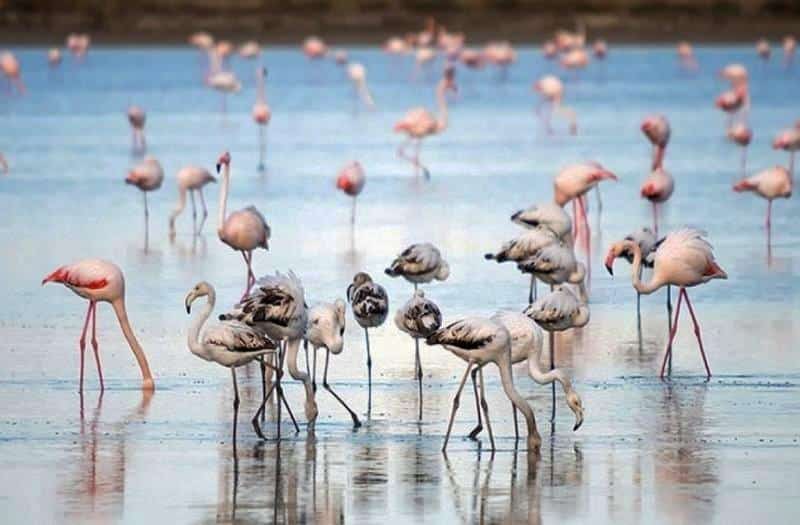The dramatic decline of flamingos in Cyprus’ wetlands has raised urgent concerns among conservationists, as habitat degradation threatens the survival of these iconic birds. Experts warn that if current trends continue, one of the island’s most spectacular natural events, the annual arrival of thousands of flamingos, could soon become a thing of the past.
Research and Monitoring Coordinator at BirdLife Cyprus, Christina Ieronymidou, highlighted the severity of the situation, telling the Cyprus Mail:
“Flamingo populations have been falling dramatically in recent years. The main reason is the degradation of their wetland habitats, particularly due to human activity and environmental changes.”
Flamingos, which primarily breed in Turkey and Syria, rely on Cyprus’ wetlands during winter, seeking refuge in the salt lakes of Larnaca, Akrotiri, Oroklini, and the occupied Famagusta region.
However, these habitats are increasingly under pressure from rapid urbanisation and pollution.
“One of the most affected areas is Akrotiri, where rapid development is encroaching on the wetlands,” Ieronymidou explained.
“Expanding infrastructure and urbanisation are altering the natural environment, making it harder for flamingos to find suitable conditions for feeding and resting.”
The biggest threat, according to Ieronymidou, is the disruption of natural water flows.
“Pollution from runoff water is also damaging the quality of these habitats,” she said. In addition to human-induced changes, she pointed out that climate change plays a role, though immediate concerns lie in localised disruptions.
Recent data from the mid-winter waterfowl surveys paint a concerning picture. In January 2025, only 30 flamingos were recorded in the Akrotiri Salt Flats, the lowest number since systematic surveys began in 1992.
This is even fewer than the numbers recorded during the severe drought of 2008.
In previous years, Akrotiri alone hosted between 100 and 250 flamingos annually, but this is a steep drop from historical figures of 2,000 to 5,000. In exceptionally good years, up to 13,000 flamingos would visit the area.
The latest figures from 2025 show that there were 27 flamingos in Akrotiri salt flats, 242 in the lakes of Famagusta, 1,065 in the Larnaca salt lakes, 95 in Oroklini, and 1,062 in Paralimni lake.
“The dramatic decline in the flamingo population is a serious indicator of the degradation of our wetlands,” said Senior Officer of the Game and Fauna Service Nikos Kassinis.
“Traditionally, the presence of water in the salt marshes was accompanied by the presence of flamingos. This relationship is no longer valid, especially in the Akrotiri salt marsh.”
Experts cite multiple contributing factors to the decline in flamingo numbers. Altered water flows due to developments in the wetland catchment area are affecting water quality and availability. Changes in the biological composition of the water, such as a decrease in zooplankton and other aquatic food sources, have reduced feeding opportunities for the birds.
Pollution from unregulated runoff water is introducing contaminants, leading to eutrophication. Wider environmental pressures, including climate change and ecological shifts in the Eastern Mediterranean, are compounding the problem.
Investigations into the origins of irregular water inflows in the northern part of Akrotiri Salt Marsh are ongoing, but conservationists fear irreversible damage if immediate action is not taken.
Environmental groups and wildlife experts are urging authorities in both the Republic of Cyprus and the British Bases to take swift action. They are calling for a full-scale investigation into the causes of the flamingo decline at Akrotiri salt lake, as well as identification of abnormal water inflows and their sources. Measures to improve water quality and prevent further pollution are crucial to restoring the ecosystem. Stronger protections must be put in place for the Ramsar-designated wetland, which is internationally recognised for its biodiversity.
The crisis extends beyond flamingos, with waterfowl populations in Akrotiri salt flats declining over the last decade. This signals a broader environmental collapse, one that could have long-lasting consequences for Cyprus’ rich biodiversity.
“If we don’t address these challenges soon, we may see fewer and fewer flamingos returning to Cyprus in the coming years,” Ieronymidou warned.
“Without stronger policies and public awareness, one of Cyprus’ most spectacular natural phenomena may be at risk of fading away.”






Click here to change your cookie preferences